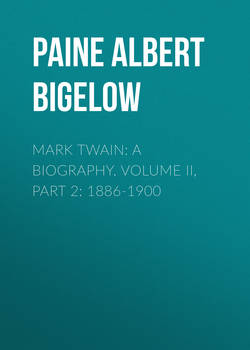Mark Twain: A Biography. Volume II, Part 2: 1886-1900

Реклама. ООО «ЛитРес», ИНН: 7719571260.
Оглавление
Paine Albert Bigelow. Mark Twain: A Biography. Volume II, Part 2: 1886-1900
VOLUME II, Part 2: 1886-1900
CLXII. BROWNING, MEREDITH, AND MEISTERSCHAFT
CLXIII. LETTER TO THE QUEEN OF ENGLAND
CLXIV. SOME FURTHER ACCOUNT OF CHARLES L. WEBSTER & CO
CLXV. LETTERS, VISITS, AND VISITORS
CLVXI. A "PLAYER" AND A MASTER OF ARTS
CLXVII. NOTES AND LITERARY MATTERS
CLXVIII. INTRODUCING NYE AND RILEY AND OTHERS
CLXIX. THE COMING OF KIPLING
CLXX "THE PRINCE AND THE PAUPER" ON THE STAGE
CLXXI "A CONNECTICUT YANKEE IN KING ARTHUR'S COURT"
CLXXII. THE "YANKEE" IN ENGLAND
CLXXIII. A SUMMER AT ONTEORA
CLXXIV. THE MACHINE
CLXXV "THE CLAIMANT"—LEAVING HARTFORD
CLXXVI. A EUROPEAN SUMMER
CLXXVII. KORNERSTRASSE,7
CLXXVIII. A WINTER IN BERLIN
CLXXIX. A DINNER WITH WILLIAM II
CLXXX. MANY WANDERINGS
CLXXXI. NAUHEIM AND THE PRINCE OF WALES
CLXXXII. THE VILLA VIVIANI
CLXXXIII. THE SIEUR DE CONTE AND JOAN
CLXXXIV. NEW HOPE IN THE MACHINE
CLXXXV. AN INTRODUCTION TO H. H. ROGERS
CLXXXVI "THE BELLE OF NEW YORK"
CLXXXVII. SOME LITERARY MATTERS
CLXXXVIII. FAILURE
CLXXXIX. AN EVENTFUL YEAR ENDS
CXC. STARTING ON THE LONG TRAIL
CXCI
CXCII "FOLLOWING THE EQUATOR"
CXCIII. THE PASSING OF SUSY
CXCIV. WINTER IN TEDWORTH SQUARE
CXCV "PERSONAL RECOLLECTIONS OF JOAN OF ARC"
CXCVI. MR. ROGERS AND HELEN KELLER
CXCVII. FINISHING THE BOOK OF TRAVEL
CXCVIII. A SUMMER IN SWITZERLAND
CXCIX. WINTER IN VIENNA
CC. MARK TWAIN PAYS HIS DEBTS
CCI. SOCIAL LIFE IN VIENNA
CCII. LITERARY WORK IN VIENNA
CCIII. AN IMPERIAL TRAGEDY
CCIV. THE SECOND WINTER IN VIENNA
CCV. SPEECHES THAT WERE NOT MADE
CCVI. A SUMMER IN SWEDEN
CCVII. 30, WELLINGTON COURT
CCVIII. MARK TWAIN AND THE WARS
CCIX. PLASMON, AND A NEW MAGAZINE
CCX. LONDON SOCIAL AFFAIRS
CCXI. DOLLIS HILL AND HOME
Отрывок из книги
The Browning readings must have begun about this time. Just what kindled Mark Twain's interest in the poetry of Robert Browning is not remembered, but very likely his earlier associations with the poet had something to do with it. Whatever the beginning, we find him, during the winter of 1886 and 1887, studiously, even violently, interested in Browning's verses, entertaining a sort of club or class who gathered to hear his rich, sympathetic, and luminous reading of the Payleyings—"With Bernard de Mandeville," "Daniel Bartoli," or "Christopher Smart." Members of the Saturday Morning Club were among his listeners and others-friends of the family. They were rather remarkable gatherings, and no one of that group but always vividly remembered the marvelously clear insight which Mark Twain's vocal personality gave to those somewhat obscure measures. They did not all of them realize that before reading a poem he studied it line by line, even word by word; dug out its last syllable of meaning, so far as lay within human possibility, and indicated with pencil every shade of emphasis which would help to reveal the poet's purpose. No student of Browning ever more devoutly persisted in trying to compass a master's intent—in such poems as "Sordello," for instance—than Mark Twain. Just what permanent benefit he received from this particular passion it is difficult to know. Once, at a class-meeting, after finishing "Easter Day," he made a remark which the class requested him to "write down." It is recorded on the fly-leaf of Dramatis Personae as follows:
In another note he speaks of the "vague dim flash of splendid hamming-birds through a fog." Whatever mental treasures he may or may not have laid up from Browning there was assuredly a deep gratification in the discovery of those splendors of "stars and suns" and the flashing "humming-birds," as there must also have been in pointing out those wonders to the little circle of devout listeners. It all seemed so worth while.
.....
Loisette naturally made the most of this advertising and flooded the public with Mark Twain testimonials. But presently Clemens decided that after all the system was not sufficiently simple to benefit the race at large. He recalled his printed letters and prevailed upon Loisette to suppress his circulars. Later he decided that the whole system was a humbug.
Neither the Yankee nor the machine was completed that fall, though returns from both were beginning to be badly needed. The financial pinch was not yet severe, but it was noticeable, and it did not relax.
.....